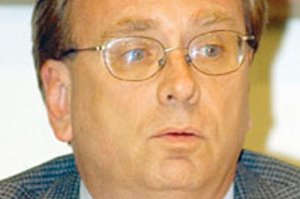Bruce Tichinin, a key figure in one of the most infamous Morgan
Hill controversies of the past decade, may get his day in court
after an appellate ruling found he could convince a jury that the
city violated his constitutional rights.
Bruce Tichinin, a key figure in one of the most infamous Morgan Hill controversies of the past decade, may get his day in court after an appellate ruling found he could convince a jury that the city violated his constitutional rights.
The right violated? Spying on a public official Tichinin thought was engaged in wrongdoing.
That wrongdoing? Having an extramarital affair that, Tichinin believed, resulted in unfavorable decisions that affected Tichinin’s clients, which included a developer and a councilwoman.
Both parties claim that if their side wins, it would be a win for the First Amendment. While Tichinin says it’s within his rights as a citizen to look into suspected misconduct, city officials argue they have free speech rights, too, and can refute such allegations.
But Tichinin says their refuting caused him significant distress professionally and personally and the 6th District Appellate Court agreed that he should get the chance to persuade a jury that the city owes him for this distress.
“The city threw mud at me, and the Constitution splashed it back in their face,” Tichinin said.
In 2004, Tichinin hired a private investigator to prove his theory that City Manager Ed Tewes and then-City Attorney Helene Leichter were having an affair.
Tichinin believed that the alleged romantic involvement led to Tewes influencing Leichter to decide against a proposed set of homes at the base of El Toro.
The investigator hired Brian Carey, who staked out a Huntington Beach hotel where Tewes stayed during a conference in February 2004.
One night Tewes returned to his room to find two cups of hot chocolate from room service that he had not ordered.
The next day, after talking with hotel personnel, Tewes became suspicious that he was being followed.
As he left his room on the way to check out, Tewes made a lot of noise in his room, and then hid in a hallway alcove and waited, assuming he would be followed. Moments later Carey walked by with a video camera. When Carey saw Tewes, he hid the camera. Tewes followed Carey to the lobby and later saw Carey watching him from a distance.
Carey later admitted to ordering the hot chocolate.
Tewes said at the time that he was shaken and distressed by what he considered to be intrusive surveillance, and he feared for his family, according to city documents.
The city formed a surveillance subcommittee consisting of councilmen Larry Carr and Greg Sellers. After the committee issued a final report on the matter, the council passed a slap-on-the-wrist resolution condemning the detective work, finding it deplorable and meritless.
The council threatened to report Tichinin to the state board, and asked him to step down from a city subcommittee.
Tichinin says this was retaliation, and that it was within his First Amendment right to free speech to conduct research to prove a theory for a potential lawsuit.
In 2006, a trial court dismissed Tichinin’s case at the city’s behest.
“My business was nearly ruined. My reputation was nearly ruined. I suffered severe emotional distress,” Tichinin said.
The same may be said for the community as a whole, according to Councilman Greg Sellers.
“It reflected negatively on the entire community, to the extent that we got coverage on something that reared its ugly head.” Sellers said. He declined to comment further since the case is ongoing.
Shaun Martin, a law professor at the University of San Diego who writes a blog on California appeals court cases, agreed with the decision in principle.
“I don’t think it’s all that radical to say that you have the right to investigate government officials,” Martin said. “The central importance of the case is that the court of appeals says … citizens may have a constitutional right to investigate (suspected misconduct) even when that involves invading the privacy of a government official.”
City Attorney Danny Wan said the city was looking forward to a full trial, noting that the appellate court’s decision was based on the motion to dismiss and not the full presentation of facts.
Wan said the city’s options are to appeal again, this time to the California Supreme Court, or allow the case to go to trial.
Tewes said he doesn’t have any thoughts on the matter and won’t until Wan recommends an option.
“I gave all the comments I had five years ago,” Tewes said.
In a 2004 statement, Tewes said, “My family and I have been deeply disturbed to learn that a local attorney, with pending matters before the city government, arranged for a secret surveillance of my activities in an effort to discredit me and the city attorney. That individual’s conduct is reckless and harmful … We may never know what motivated the individuals responsible, but we know with certainty that the belief that the city attorney and I were having an affair is baseless and untrue. We know that some may have spread damaging rumors no matter how false. This has been a trying time for me personally, but I have confirmed to the City Council my intent to meet my responsibilities to the community and the city staff without fear or favor.”
Leichter, now Santa Clara’s city attorney, could not be reached for comment. She was awarded $215,000 in salary, benefits and “alleged physical injury or sickness” in a settlement agreement when she resigned in April 2005.
As of November 2006, the Tichinin lawsuit had already cost the city $100,000, according to a previous Times story.
Chang, who did not seek a third term as councilwoman in November 2004, is out of town until Oct. 1, according to her voicemail message. She now serves on California’s medical board.
Brian Carey could not be reached for comment by press time either. He is now a popular bartender in Santa Cruz County, according to his MySpace page and other Internet sources.














